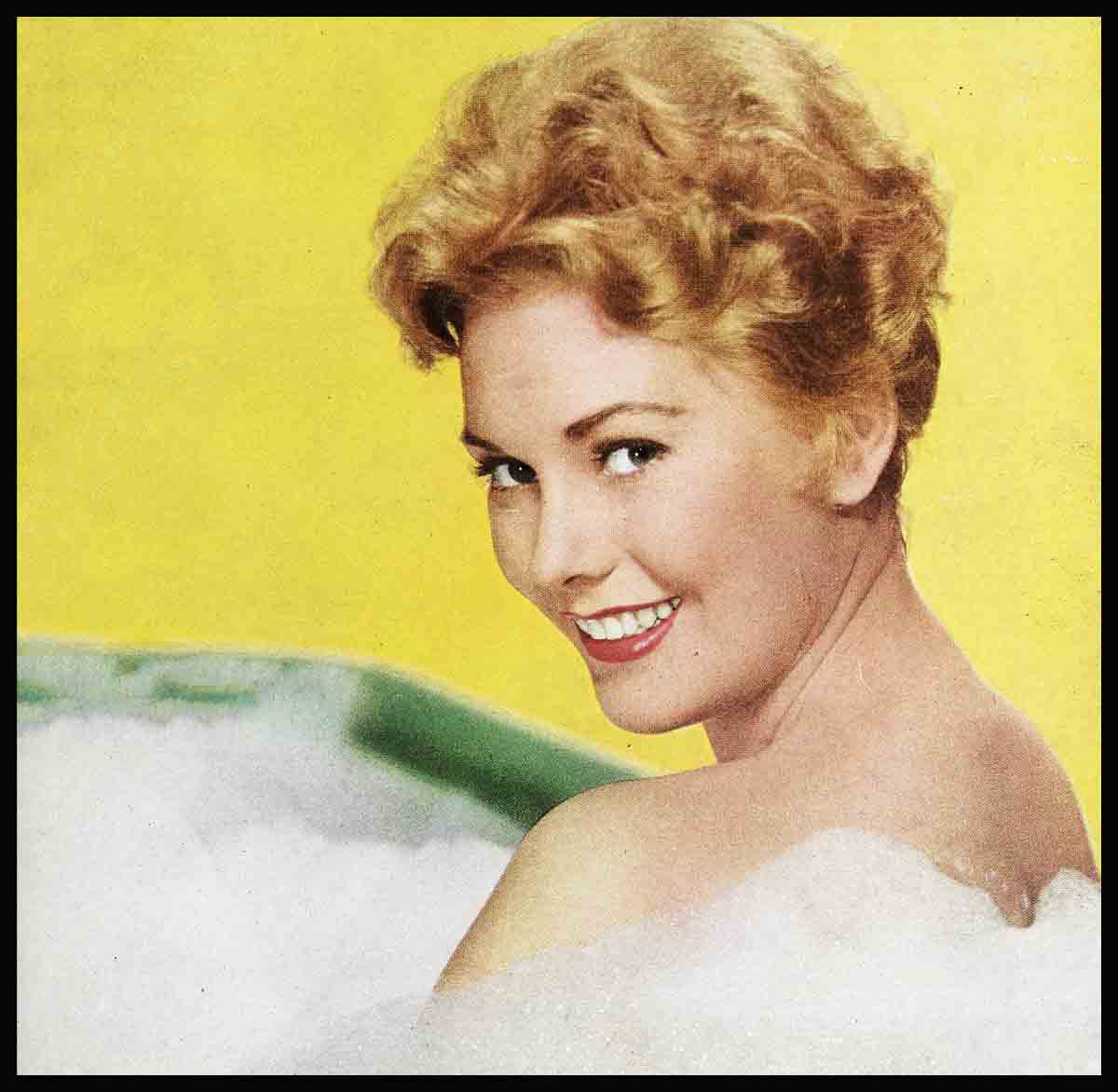
Faith Began With A Wishing Tree—Kim Novak
Lloyds of London would snort at a request to insure them, a thief would get the horse laugh for wasting his talents, but, if they disappeared, no stone would be left unturned to ferret them out. The giant publicity department of Columbia studios would grind out stories for every newspaper in the land. Detailed descriptions would be sent to the police department. News commentators would make a plea for the return to their rightful owner. She would be inconsolable until they were found.
They have very little monetary value. But to Kim Novak, their worth is so great that it is inestimable.
Kim calls them her lucky pieces. In reality, they are symbols of love and faith—tangible evidence that she is loved and there are those who have faith in her.
“If you have love and faith,” Kim says, “you have everything. These are happiness.
“If faith and love will be your guide, the Lord will walk at your side. That’s a phrase I made up to sing to Brahms’ Lullaby.” Kim rose from her chair and picked up a large clown with a big red nose. She twisted the wooden nose and a music box tinkled out the “Lullaby.”
“I play this often. It kind of helps to remind me that I have received love and can therefore give love and that because others have faith in me, I can have faith in myself.”
Because all her life Kim has suffered from personal insecurity, she needs a concrete expression of love and faith. When she holds her grandmother’s rosary in her hand, when she fingers the gold miniature Oscar, a gift from the director of her first picture, when she twirls the gold signet ring given her by best beau Mac Krim, she feels secure.
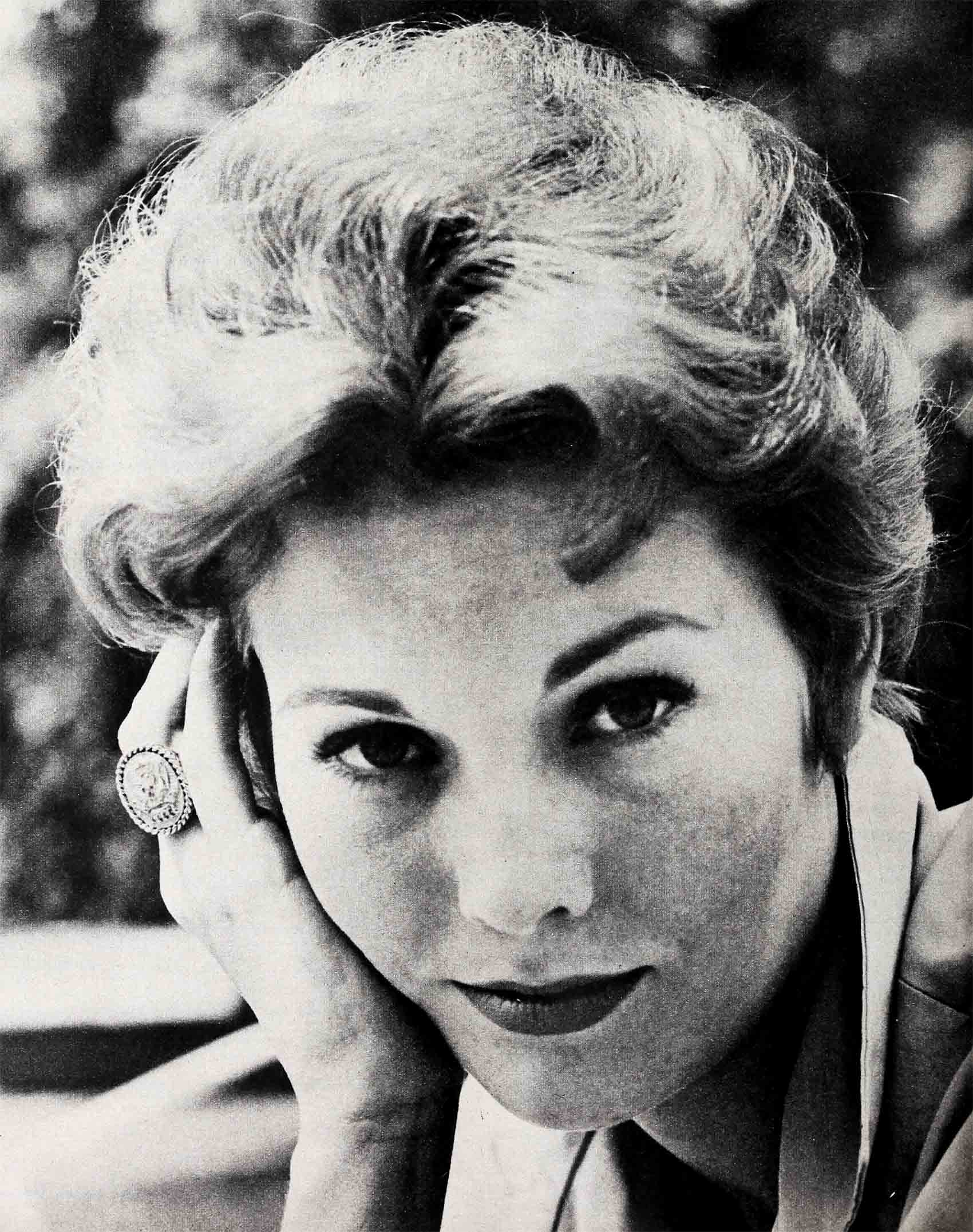
Each piece tells a story. A story of someone whose importance to Kim has been so great as to turn the course of her life, to remold the personality she shows to the world and to touch upon the inner spring that motivates the girl, Kim Novak.
“I never approach anything important without at least one of my lucky pieces,” Kim said. “I keep them in an overnight case and when I make a screen test or start a new picture, I bring the case to the studio with me.”
Kim leaned back in her chair for a moment, but she was not relaxed. She was like a graceful gazelle, poised in mid-flight. She was devoid of make-up, a few hair clamps framed her face. She wore a white starched uniform, such as a beautician wears. Shortly, the clamps would be pulled out, the curls combed and lipstick applied, high-lighting her delicate flowerlike beauty. She would soon step before the camera with Tyrone Power to make a screen test for “The Eddie Duchin Story.”
Kim was already set for the role, but there were make-up and clothes tests to be made before the company flew to New York to begin actual shooting. Life was closing in fast on Kim. Her career had been stepped into such high gear, she sometimes felt difficulty in breathing. She was going fast and she was going high.
A week before she had moved, temporarily, out of her beloved Studio Club, into the penthouse on the Columbia lot. It sounds very grand. But in reality it’s a modestly furnished two-room suite. Kim moved in because she literally did not have time to travel the few blocks back and forth to the Club between tests, conferences, dramatic lessons, script rehearsals, interviews with the press and the dozen other demands upon her time. She was not happy, for Kim loves the Club and enjoys the friendship of the many girls there, all of whom share her ambitions.
Her stand-in, Diane, shared the suite with her. She and Kim have been friends since they met on the set of Kim’s first picture, “Pushover.” Diane understood when Kim needed quiet to think or when she needed to let loose and talk a blue streak. She helped her to memorize her script by giving her the cues and she helped her by just being there.
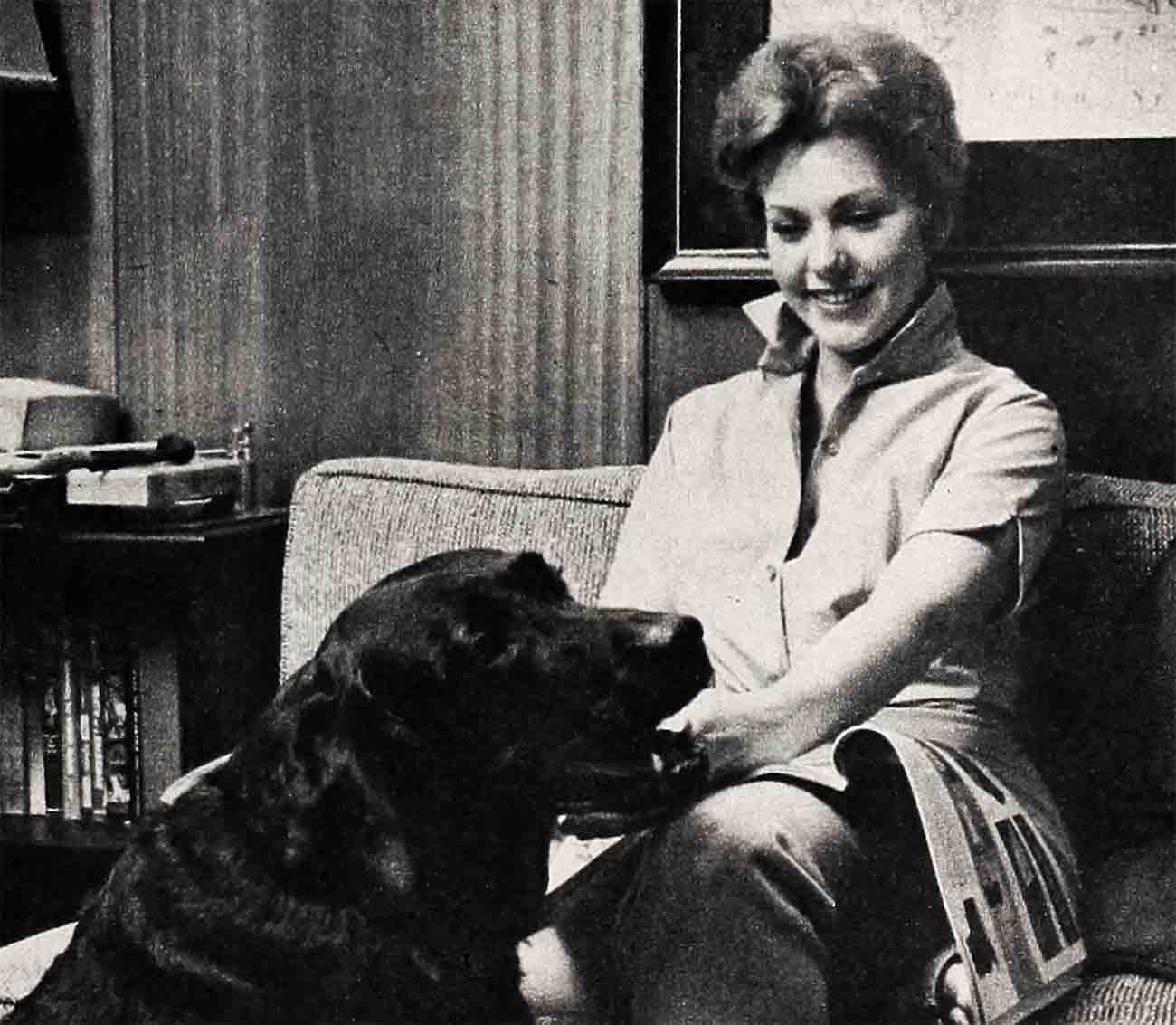
A few weeks before, Kim had finished work on her most important dramatic screen role to date. The role of the beautiful young girl in the screen version of the Broadway hit play, “Picnic.” Kim felt that more depended on how she came through in this picture than on any other picture she did. For one thing, she had to hold her own with talents like Rosalind Russell and William Holden. Her role was a difficult one, which demanded more real acting ability than any of the other parts she has played. She couldn’t depend on snappy lines or cute pieces of business. She had serious lines to speak and she felt the sincerity with which she put them across would make the difference between whether she was going to be another Hollywood blond riding on the crest of a big publicity build-up or a truly fine dramatic actress. How well Kim succeeded was evidenced by the fact that when the Columbia executives saw the rough cut of the film her contract was torn up and another more lucrative one written.
Kim feels she’s in rarefied air. She’s come there awfully fast and she’s come there very young. Frankly, sometimes she’s scared. Her confidence wavers and she wonders if maybe she isn’t in over her depth. These are the times when she most needs her lucky pieces.
“You might say my first lucky piece was given me by God,” Kim continued. “It was a cherry tree in my back yard. Because its branches grew in the shape of a wishbone, I called it my wishing tree. Since I was a tall and gawky kid and never seemed to fit in with the others at school, I had a lot of wishing to do. I wished to have store-bought clothes, instead of the ones my grandmother made me. They were lovely, but not like the other kids had. I wished that I could cut my braids because the other girls didn’t wear them. I felt out of place and, because of this, I wasn’t able to express my true feelings and I wasn’t well liked. I used to sit by the hour in front of my tree, wishing to be popular. It never made me popular, but it did give me comfort and consolation.
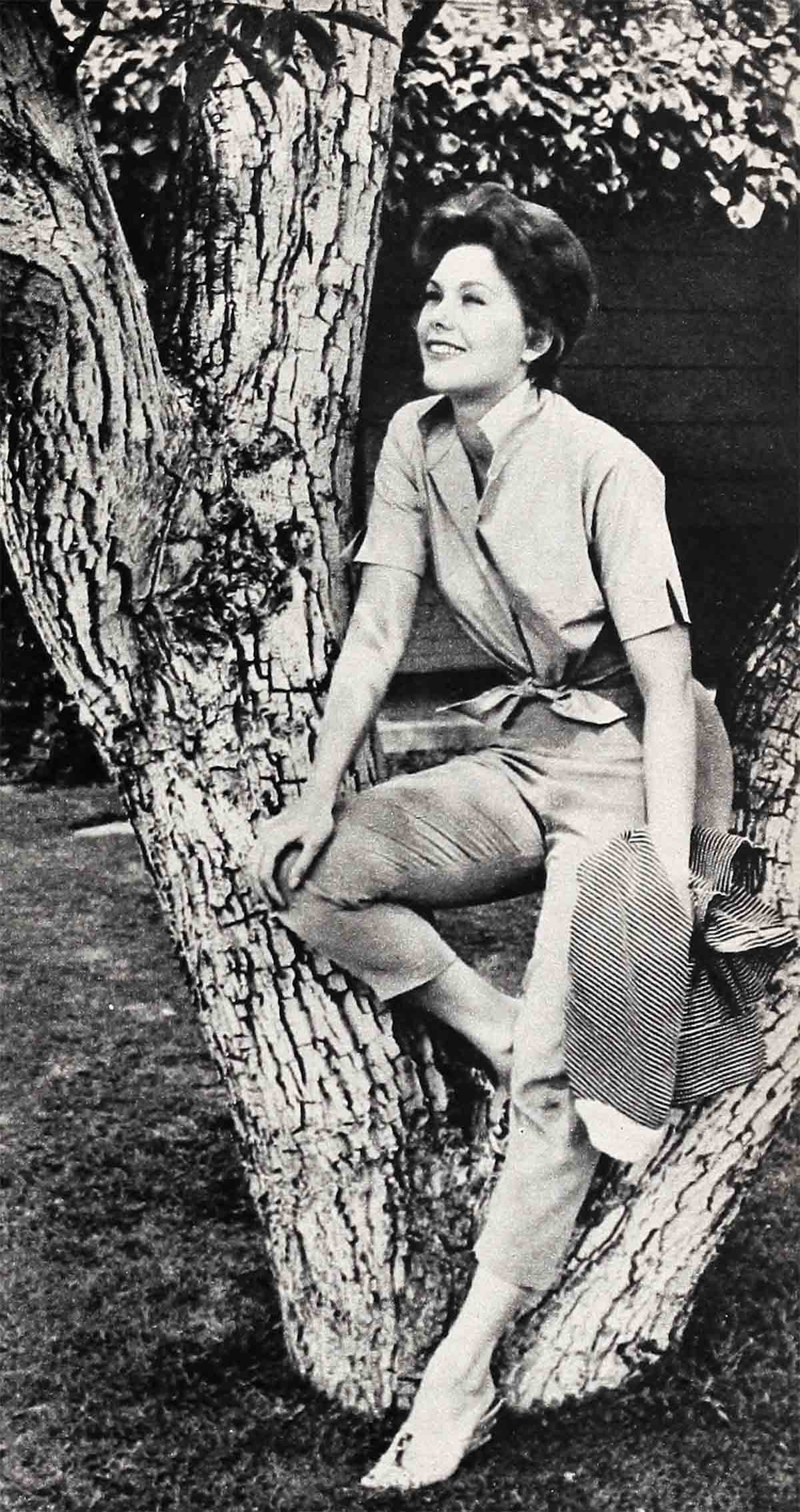
“Last Christmas the president of my fan club sent me a gold and pearl bracelet with a wishbone on it. I was deeply touched. When I look at it now I am reminded of the picture of myself as a child and the strides I’ve made in my own development and the people who have helped me. From my childhood I remember the expression ‘God helps those who help themselves.’ When Mother, recognizing my feelings of inferiority, took me to join a group of teenagers called the Fair-Teen Club, I made up my mind I’d make a big effort to fit in, to be one of the group.
“Norma Kasell, who ran the club, helped me tremendously by asking me to help her. This gave me an immediate feeling of belonging. We used to give fashion shows and I found, much to my surprise, that I was not as nervous on-stage as I was off. I started helping the other girls to develop stage poise, helping them with their clothes and talking about their hair problems. When I was made a member of the board of directors to help plan the club’s activities, I had a feeling of great personal achievement.
“I still have the Fair-Teen bracelet, given to the members of the club. It keeps me from forgetting the faith Mrs. Kasell had in me. She literally pushed me into a modeling contest for a $400 scholarship to Patricia Stevens’ professional modeling school. I felt I wasn’t pretty and I wasn’t right, but Mrs. Kasell said, “You’re as good as anyone, and prettier, too.’ Her faith in me gave me the confidence I needed. In reality, my Fair-Teen bracelet signifies the start of my movie career. I won the contest, which led to my becoming a professional model which, in turn, led to a modeling job that finally landed me in Hollywood.”
Kim’s meteoric rise to stardom in less than two years is Hollywood history now. From the outside looking in, it seems so easy. But only Kim knows the emotional turmoil that went on inside as she made each step forward.
“I had my two clowns with me,” Kim went on. “The clown I sang my Lullaby to and the one I call my kissing clown. Ever since I was a little girl, I’ve loved clowns. They’re always laughing and smiling, even sometimes in the face of tragedy. I bought my kissing clown when I first started modeling. I’d take it along with me on every job I’d do for good luck. I still kiss this clown for good luck before I go into a scene.
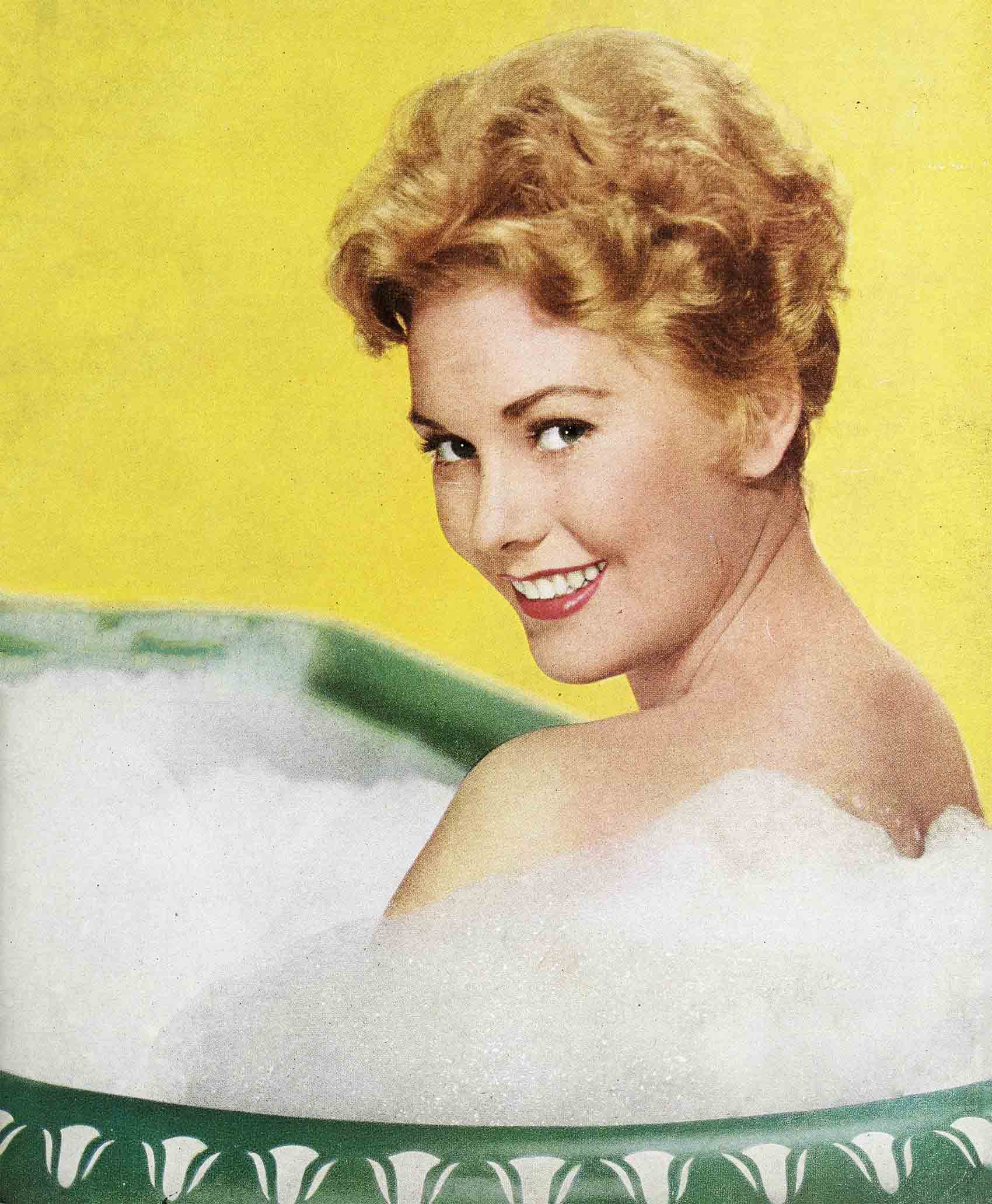
“Grandmother used to call me a kissing bug, because when I was a child I always wanted to be close and cuddle to someone. I’d always be rushing up to her to kiss her. She would kid me about it. Sometimes. when she was very busy, she’d scold me. This hurt me very much. Grandmother was a very good woman, always doing things for people, but she had been raised in the old country in a very strict atmosphere. She didn’t understand my need for her to demonstrate her affection for me. Because she wasn’t demonstrative, I felt she didn’t love me, that she favored my sister. I wanted to do something to win her love. She was a very religious woman and it grieved her that neither my sister nor I had been confirmed. When I realized this, I decided to make my confirmation to show her how much I loved her. Even though I had a heavy schedule in high school, I learned all the prayers, went to church every morning before school and then to study after school. My grandmother was so touched by my efforts that we became closer.
“Shortly before she passed away, she asked me to help her sort through some of her jewelry. She wanted to know what I would like to have. She had a pair of diamond earrings and one, she said, was for my sister and one was for me. But out of the pile of jewelry I picked up a plain black beaded rosary. ‘I love these,’ I told her. She took the rosary into her hands and, as she fingered the beads, I felt that a flood of memories was passing through her mind. “That’s my special one,’ she said quietly, ‘the one I’ve had all my life. It will be for you when I am gone.’ It was strange but I felt a sense of exhilaration I’d never experienced before. I knew that with the rosary I’d always have tangible evidence of the love I’d won and the faith my grandmother had in me. I vowed then that I’d live up to that faith. Realizing how much this sentiment meant to me, I vowed that I would not be afraid to show my true feelings to other people.
“I don’t believe that people should gush over others and say things they don’t mean just to win friends. But everyone needs tenderness, an expression from others that they are liked or loved. Trying to get along without sentiment is like trying to live in a world without flowers.
“I’ve made it a point to show people my sincere thanks when they do me a favor, to tell my friends when they look particularly well in some dress or color and to give them little gifts that may mean to them what my lucky pieces mean to me.
“When I was in Kansas making ‘Picnic,’ on the set there was the sweetest little boy who was under the supervision of the Children’s Authority. He was so delighted at being a part of something, of belonging, that he knocked himself out doing little things for us, like bringing us a cool drink or candy bar. He was particularly nice to me and followed me around wherever I went. I noticed that he wore an ordinary key chain around his neck with nothing on it. I asked him why. His reply was ‘Oh, this is my good-luck piece.’ My heart went out to him because I knew how deeply he felt a need to know that something or someone was watching over him. He was doing what I had done the day I bought myself a clown to bolster up my courage when I had a modeling job to do. I sent to Hollywood for a gold chain with a little medallion on it and had it inscribed ‘Thanks for the Picnic. Love, Kim.’ When I gave it to him, he took off his key chain and put it around my neck. I still have it.
“He’s had a rough time in his first twelve years, and I know the going won’t always be easy for him during the next twelve. It seldom is for anyone. But I hope the medallion I gave him will be a reminder that someone has faith in him, that he’ll make the grade, just as the miniature Oscar given me by Dick Quine reminds me of the faith he and so many others have in my ability as an actress.
“Dick gave me the medallion when I’d completed my last scene in ‘Pushover.’ I don’t think anyone was more frightened of failure than I was during the shooting of my first picture. If it hadn’t been for his constant encouragement and that of Max Arnow, who is executive in charge of talent, I might have given up and fled back to Chicago.
“So many people have given me so much help and encouragement. My grandmother gave me faith in religion. Norma Kasell gave me faith in my looks; the girls at the Studio Club gave me faith in my judgment by electing me to the House Council; my stand-in, Diane, gave me faith that the women I work with like me.”
Kim looked down at the gold signet ring she was wearing on her right hand. There are several rings in her collection of lucky pieces, but she never wears them. She seldom wears any jewelry.
“Mac gave me this,” she volunteered. “He gave me faith in myself as a woman.”
There was a knock on the door. It was the hairdresser come to take the clips out of Kim’s hair. In a few moments she would be on the sound stage. Her ability, her beauty, her womanliness would be under scrutiny. She would slip her rosary into her pocket, kiss her clown, glance down at her gold ring and walk confidently into the glare of the white, hot lights, knowing there were those who loved her.
THE END
It is a quote. PHOTOPLAY MAGAZINE NOVEMBER 1955





pineapple
19 Şubat 2023It’s an remarkable piece of wгiting in favoг of all the internet people; theу will obtain benefit fгom it I am sure.